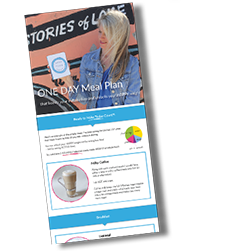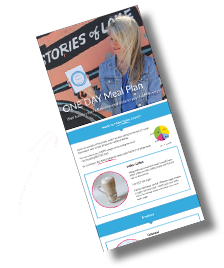
- Do you advocate for yourself?
- Life is messy; embrace it
- Find out how to advocate for yourself
This post gives a solution to 5 common weight-loss misconceptions:
Advocate for yourself
All 5 misunderstandings were captured in a short diary entry written by a 13 year-old.
Rebecca courageously shared her weight-loss struggle
on the Grownups Read Things They Wrote as Kids Podcast.
To get the most out of this post, read Common Weight-loss Misconceptions Intro
& Common Weight-loss Misconceptions #1, #2, #3, #4 and #5.
Do you advocate for yourself?

When you don’t talk to other people it’s easy to get the wrong end of the stick. I kept my weight-loss strategies to myself for years. It wasn’t until I opened up that I discovered a lot of my weight-loss strategies actually set me up to fail.
I wanted to write this post to encourage you to advocate for yourself. Find out why you should feel proud instead of ashamed. Then it’s easier to share your struggles.
Common weight-loss misconception solution:
Advocate for yourself
Adult Rebecca reflecting on her 13 year old self:
“What really struck me … was how desperate I was to be found out. I was so ashamed of my secret but at the same time I was desperate for help. I just couldn’t deal with it on my own anymore. But I didn’t know how to ask for help.”
Problem:
Shame leads to secrecy and secrecy allows misinformation to go unchallenged. Then small problems become big problems. And big problems fuel shame.
Shame creates a vicious cycle that makes it harder and harder to advocate for yourself.

My experience: I didn’t know you should advocate for yourself
When I was struggling with an eating disorder I burnt all my diaries. I pretended to have the flu so I could stay home alone. Each book was ripped apart and thrown into the fireplace. It was New Year’s Eve and I was trying to draw a line in the sand to mark a new start. I knew I’d regret it, but that was the point. I wanted to do something irreversible; something that would push me to try harder to stick to my (self-defeating) diet. This result would make losing all the stories, poems and artwork I’d compiled over the years worth it. I thought hurting myself this way would mean “tomorrow will be different.” But of course, upping the anti didn’t work.
Willpower was never the problem.
Believing I lacked discipline made me feel ashamed. So I wanted to keep my weight-loss struggles a secret. Isolating myself with misinformation made everything worse. It took me 10 years to lose 10 pounds because I didn’t open up.
Sadly, I’m not alone. Lena Dunham and Rebecca, among countless others, avoid asking for help when they need it most.
I’m too embarrassed to tell them I want to lose fat… I didn’t want to tell her anything. She would think I was stupid.
– Rebecca from the GRTTWaK Podcast
Both Lena and Rebecca wrote about their weight-loss struggles in a diary at an early age. And both their entries highlight the misinformation they had about weight loss. Rebecca had body image issues all her life and went on to have an eating disorder in university. Imagine if any of us had shared our (mis)beliefs with someone nonjudgmental? Imagine all the time we would have saved and all the energy we could have put toward something we care about?
A stitch in time saves nine
– Thomas Fuller, historian
My first of many turning points happened during my first year at university. I went to the student health center and spoke to a doctor. She matched me up with a psychiatrist who helped me break down misunderstandings about eating and exercise; by then I’d been preoccupied by trying to lose weight for more than 5 years. I’m so thankful I could get that help. It was the start of me understanding what was going on. Then I could make informed decisions and get healthy.
Asking for help at the Student Health Center was the first time I experienced how powerful it is to advocate for yourself.
It took about as long to get healthy as I’d been sick. For 5 years (all of high school) I developed a complicated relationship with food and then for 5 years (all of university and teacher’s college) I started talking to different people and getting various pieces of information that helped me unpick all the tangled misinformation I’d collected. It took 10 years again after that to understand what had gone on! When I finally understood I no longer felt ashamed. And that’s when I started writing this blog.
Good news
The good news is that if you understand someone else’s journey you can save yourself a lot of time. I never spoke to anyone who had experienced an unhealthy relationship with food, so I didn’t understand a lot of the things I was experiencing. For example, I didn’t know that binging and purging could develop into a coping mechanism for stress. Learning from people’s mistakes speeds up your recovery.

Solution: Advocate for yourself
We need to encourage people to share their experiences.
Pretending everything is ok to protect (or impress) people around you, doesn’t help anybody.
Life is messy. Learning is messy. Becoming the best person you can be is messy. Finding yourself in a difficult situation is part of being human and figuring out who you are.
When you accept this truth and understand overcoming obstacles gives you strength, knowledge and empathy you’d otherwise not have, it’s easier to advocate for yourself. It’s easier to say, “Hey, I’ve got a problem. Can you help?”

You can break the cycle of shame, secrecy, big problems and more shame by opening up with someone you trust.
Get to the heart of the issue. Then you can educate yourself, break down misinformation and build healthy habits.
Getting started 
Find someone you can speak to as openly as a diary entry. Or write a diary entry about what’s going on and share it with someone you trust. Together you can figure out the next steps.
Advocate for yourself by educating yourself. You can:
- ask for help
- explain what’s going on
- learn from other people’s mistakes
- make a doctor’s appointment if necessary
- read; do some of your own research
Here’s a good place to start. Consider reading and discussing the 5 common misconceptions that follow with someone who has your best interests at heart. When you understand why these approaches to weight loss work against you, you’ll be able to turn your attention to more constructive weight-loss strategies.
 Common Weight-loss Misconception #1:
Common Weight-loss Misconception #1:
Life will get better when you lose weight
It’s important to make losing weight a health goal you work toward rather than where you base your self worth. Focus on real beauty: your interests and how you use them. Read More
 Common Weight-loss Misconception #2:
Common Weight-loss Misconception #2:
Keep your weight-loss goals secret
Secrets isolate you with misinformation and turn small problems into huge hurdles. Being honest moves mountains quickly!
Read More
 Common Weight-loss Misconception #3:
Common Weight-loss Misconception #3:
If you think your daughter has an eating disorder, don’t intervene
Don’t wait to be asked for help if you think your daughter has an eating disorder. You can prevent an eating disorder from escalating if your loved one has the opportunity to open up. Make yourself approachable, learn together and build in accountability. Read More
 Common Weight-loss Misconception #4:
Common Weight-loss Misconception #4:
Your weight-loss strategy is right
Stop blaming yourself and look at your weight-loss information. If you’re having trouble reaching and maintaining a healthy weight it’s time to try a new weight-loss strategy. Educate yourself! Learn what healthy eating and exercise looks like and get a strategy to turn your present habits into healthy habits. Read More
 Common Weight-loss Misconception #5:
Common Weight-loss Misconception #5:
Tomorrow will be different
Tomorrow will be different if, and only if, you do something positive today. Read More

Troubleshooting: Advocate for yourself
If you speak to someone and don’t get his or her support remember, that is a reflection of them, not you. Don’t be silenced. Speak to someone else. Keep reaching out until you find someone who will listen and help. When you find the right person it will make your relationship stronger.
Summary: Advocate for yourself

Is an eating disorder a coming of age story?
An eating disorder is a coming of age story. Overcoming a difficult obstacle makes you more equipped to tackle future situations. Rather than feeling ashamed and being silent, be proud of yourself for being proactive. Advocate for yourself.
If I could go back in time and talk to myself I would tell that young woman that it’s ok. It’s going to shape who you are.
– Rebecca from the GRTTWaK Podcast
If something is going on in your life and you’re not happy about where it’s heading, advocate for yourself. Effective problem solving begins with communication.
People all around us have eating disorders and suffer in silence … It would be my hope that if anyone out there is suffering and doesn’t know what to do, that they know they’re not alone and there’s lots of support groups out there …
– Rebecca from the GRTTWaK Podcast
Talking with others helps avoid common weight-loss misconceptions. Opening up is a sign of strength, not weakness.
When you advocate for yourself it will be your first turning point toward health. No matter how difficult you think it is to reach out, it’s worth it. Embrace vulnerability! Be open. It’s ok if you cry. Don’t let another day slip away without connecting with someone who will listen to what’s going on in your life.
Many thanks to Rebecca. By being open about her experience she has helped others understand why you should advocate for yourself; a choice that speeds up recovery.
Build healthy eating and exercise habits. A healthy weight will follow.
Next Steps:Think of three people you could speak to about your experience. Decide who you’ll speak to first and plan the next steps together. Sign up for my weekly blog post (below) and you’ll receive one of the best strategies I learned. It will help you build healthy eating and exercise habits—or reach any goal.
The power of vulnerability by Brené Brown
Advocate for yourself. It’s all about embracing the power of vulnerability.

 These kinds of meals and snacks unlocked my HAPPY weight 21+ years ago (I lost 30 pounds without dieting!)
These kinds of meals and snacks unlocked my HAPPY weight 21+ years ago (I lost 30 pounds without dieting!)
You'll also be subscribed to my newsletter. Don’t like it? Unsubscribe in one click

 These kinds of meals and snacks unlocked my HAPPY weight 21+ years ago (I lost 30 pounds without dieting!)
These kinds of meals and snacks unlocked my HAPPY weight 21+ years ago (I lost 30 pounds without dieting!)
You'll also be subscribed to my newsletter. Don’t like it? Unsubscribe in one click




Sharing what I learned makes the 10 years I STRUGGLED worth it
Do you remember a time you decided to advocate for yourself? Or a time you didn’t?






I love the Java location for the first photo! Another great blog Kelly – keep up the good work x
Thanks! Was great to go to Java 🙂 Love watching all the action on Queen Street.
Great (and refreshing!) content layout, thanks for putting in the work.